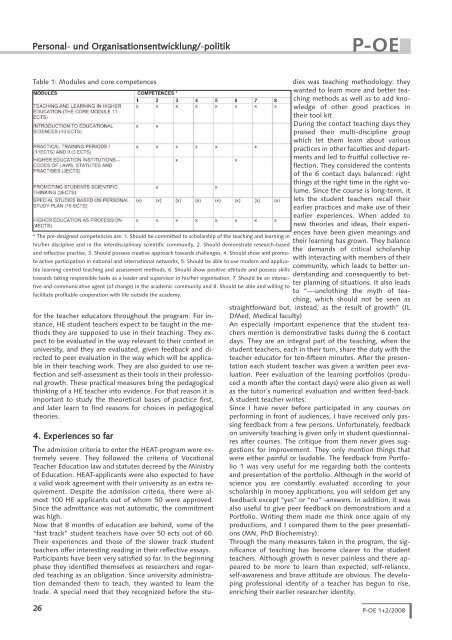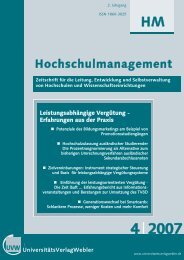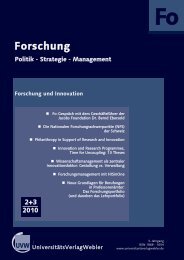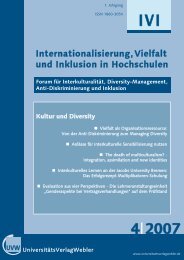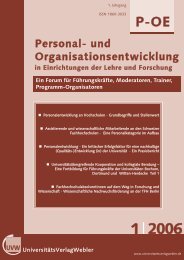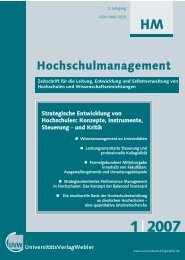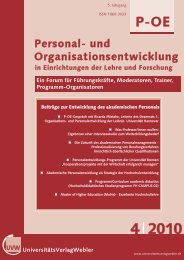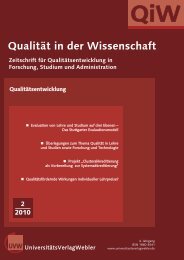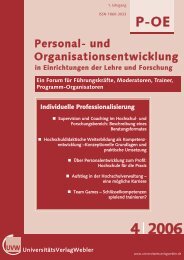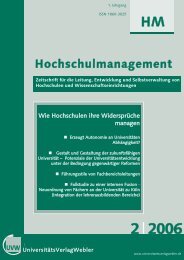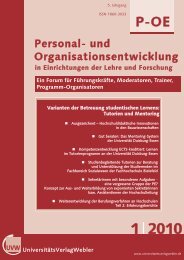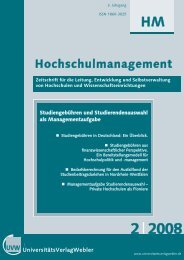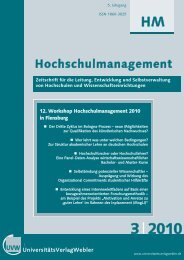P-OE - UniversitätsVerlagWebler
P-OE - UniversitätsVerlagWebler
P-OE - UniversitätsVerlagWebler
Sie wollen auch ein ePaper? Erhöhen Sie die Reichweite Ihrer Titel.
YUMPU macht aus Druck-PDFs automatisch weboptimierte ePaper, die Google liebt.
Personal- und Organisationsentwicklung/-politik<br />
P-<strong>OE</strong><br />
Table 1: Modules and core competences<br />
* The pre-designed competencies are: 1. Should be committed to scholarship of the teaching and learning in<br />
his/her discipline and in the interdisciplinary scientific community, 2. Should demonstrate research-based<br />
and reflective practise, 3. Should possess creative approach towards challenges, 4. Should show and promote<br />
active participation in national and international networks, 5. Should be able to use modern and applicable<br />
learning centred teaching and assessment methods, 6. Should show positive attitude and possess skills<br />
towards taking responsible tasks as a leader and supervisor in his/her organisation, 7. Should be an interactive<br />
and communicative agent (of change) in the academic community and 8. Should be able and willing to<br />
facilitate profitable cooperation with life outside the academy.<br />
for the teacher educators throughout the program. For instance,<br />
HE student teachers expect to be taught in the methods<br />
they are supposed to use in their teaching. They expect<br />
to be evaluated in the way relevant to their context in<br />
university, and they are evaluated, given feedback and directed<br />
to peer evaluation in the way which will be applicable<br />
in their teaching work. They are also guided to use reflection<br />
and self-assessment as their tools in their professional<br />
growth. These practical measures bring the pedagogical<br />
thinking of a HE teacher into evidence. For that reason it is<br />
important to study the theoretical bases of practice first,<br />
and later learn to find reasons for choices in pedagogical<br />
theories.<br />
4. Experiences so far<br />
The admission criteria to enter the HEAT-program were extremely<br />
severe. They followed the criteria of Vocational<br />
Teacher Education law and statutes decreed by the Ministry<br />
of Education. HEAT-applicants were also expected to have<br />
a valid work agreement with their university as an extra requirement.<br />
Despite the admission criteria, there were almost<br />
100 HE applicants out of whom 50 were approved.<br />
Since the admittance was not automatic, the commitment<br />
was high.<br />
Now that 8 months of education are behind, some of the<br />
“fast track” student teachers have over 50 ects out of 60.<br />
Their experiences and those of the slower track student<br />
teachers offer interesting reading in their reflective essays.<br />
Participants have been very satisfied so far. In the beginning<br />
phase they identified themselves as researchers and regarded<br />
teaching as an obligation. Since university administration<br />
demanded them to teach, they wanted to learn the<br />
trade. A special need that they recognized before the studies<br />
was teaching methodology: they<br />
wanted to learn more and better teaching<br />
methods as well as to add knowledge<br />
of other good practices in<br />
their tool kit.<br />
During the contact teaching days they<br />
praised their multi-discipline group<br />
which let them learn about various<br />
practices in other faculties and departments<br />
and led to fruitful collective reflection.<br />
They considered the contents<br />
of the 6 contact days balanced: right<br />
things at the right time in the right volume.<br />
Since the course is long-term, it<br />
lets the student teachers recall their<br />
earlier practices and make use of their<br />
earlier experiences. When added to<br />
new theories and ideas, their experiences<br />
have been given meanings and<br />
their learning has grown. They balance<br />
the demands of critical scholarship<br />
with interacting with members of their<br />
community, which leads to better understanding<br />
and consequently to better<br />
planning of situations. It also leads<br />
to “---unclothing the myth of teaching,<br />
which should not be seen as<br />
straightforward but, instead, as the result of growth” (JL<br />
DMed, Medical faculty)<br />
An especially important experience that the student teachers<br />
mention is demonstrative tasks during the 6 contact<br />
days. They are an integral part of the teaching, when the<br />
student teachers, each in their turn, share the duty with the<br />
teacher educator for ten-fifteen minutes. After the presentation<br />
each student teacher was given a written peer evaluation.<br />
Peer evaluation of the learning portfolios (produced<br />
a month after the contact days) were also given as well<br />
as the tutor´s numerical evaluation and written feed-back.<br />
A student teacher writes:<br />
Since I have never before participated in any courses on<br />
performing in front of audiences, I have received only passing<br />
feedback from a few persons. Unfortunately, feedback<br />
on university teaching is given only in student questionnaires<br />
after courses. The critique from them never gives suggestions<br />
for improvement. They only mention things that<br />
were either painful or laudable. The feedback from Portfolio<br />
1 was very useful for me regarding both the contents<br />
and presentation of the portfolio. Although in the world of<br />
science you are constantly evaluated according to your<br />
scholarship in money applications, you will seldom get any<br />
feedback except “yes” or “no” -answers. In addition, it was<br />
also useful to give peer feedback on demonstrations and a<br />
Portfolio. Writing them made me think once again of my<br />
productions, and I compared them to the peer presentations<br />
(MN, PhD Biochemistry).<br />
Through the many measures taken in the program, the significance<br />
of teaching has become clearer to the student<br />
teachers. Although growth is never painless and there appeared<br />
to be more to learn than expected, self-reliance,<br />
self-awareness and brave attitude are obvious. The developing<br />
professional identity of a teacher has begun to rise,<br />
enriching their earlier researcher identity.<br />
26<br />
P-<strong>OE</strong> 1+2/2008


